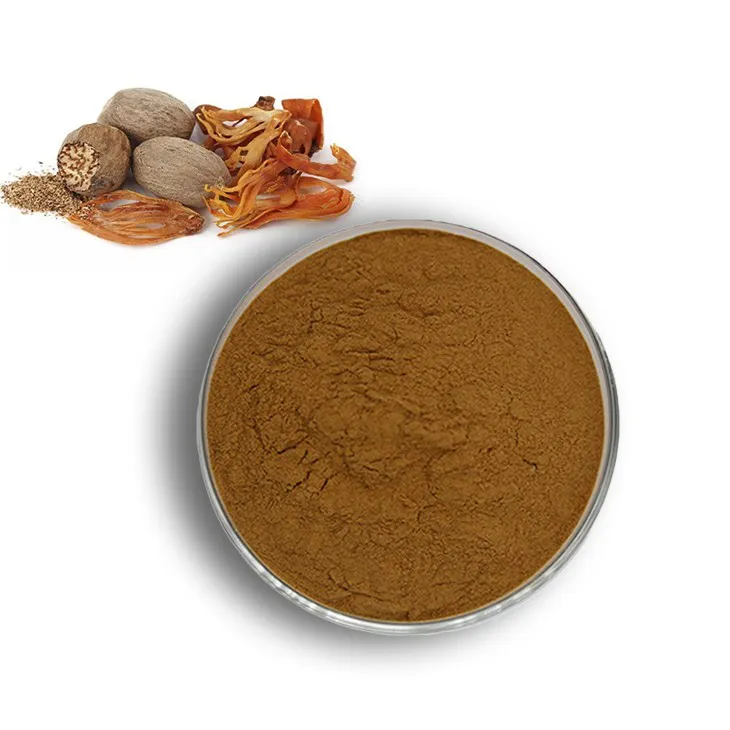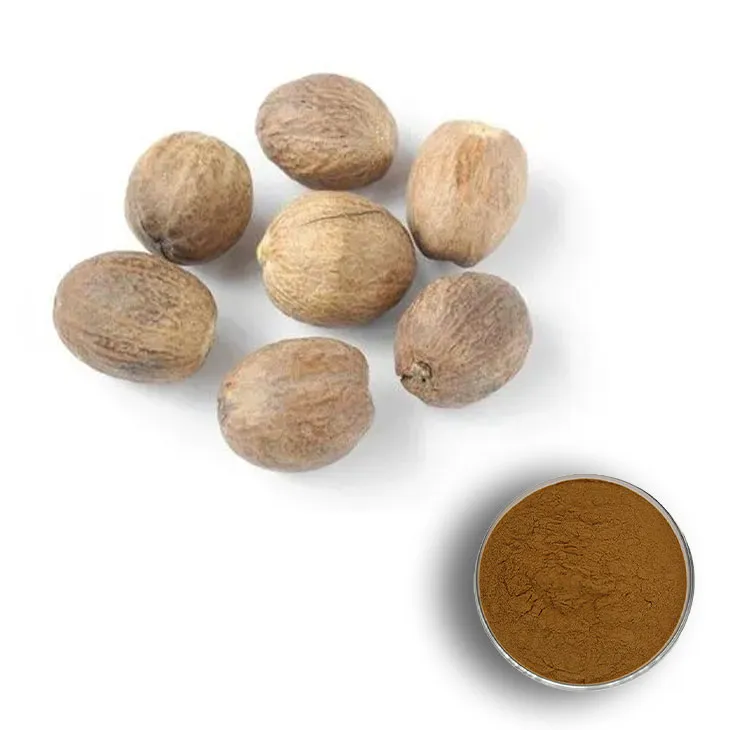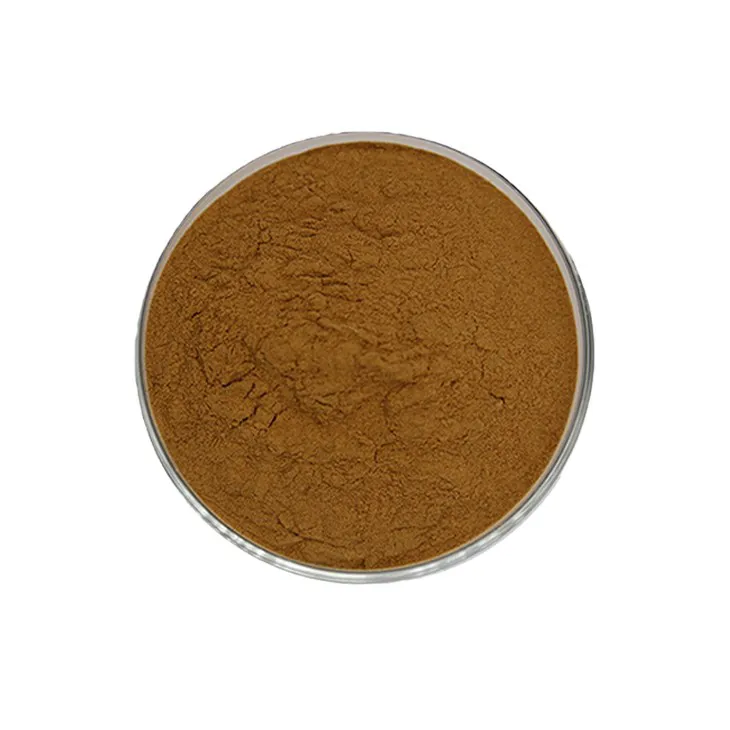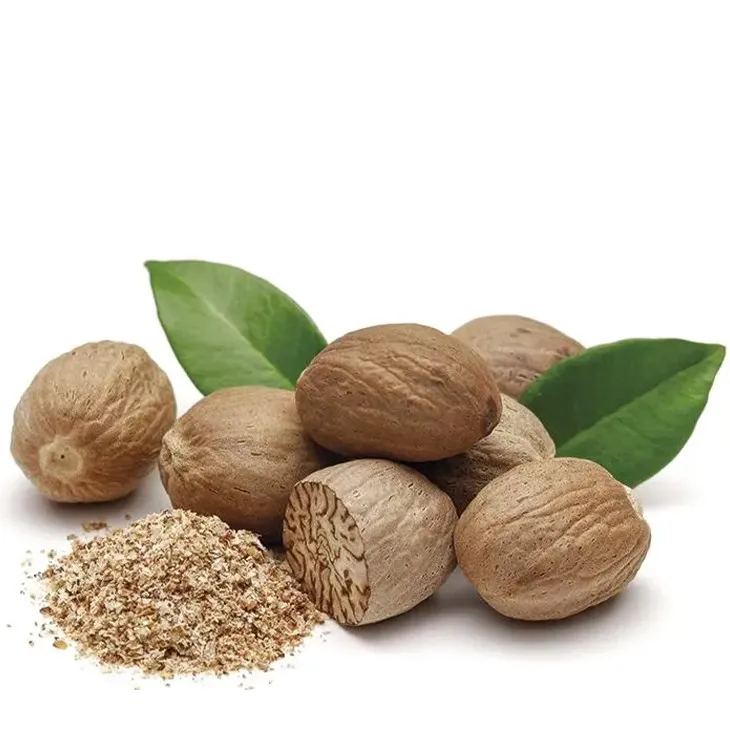- 0086-571-85302990
- sales@greenskybio.com
How to Use Nutmeg Extract? The Spice in the Culinary World.
2024-12-09

Introduction
Nutmeg Extract is a wonderful addition to the culinary world. Derived from the nutmeg seed, it has a warm, spicy, and slightly sweet flavor that can enhance a wide variety of dishes. Whether you're an experienced chef or a novice in the kitchen, understanding how to use Nutmeg Extract effectively can take your cooking to new heights.

Using Nutmeg Extract in Baking
1. Cakes
When it comes to baking cakes, nutmeg extract can add a unique depth of flavor. For a simple vanilla cake, add about 1/4 to 1/2 teaspoon of nutmeg extract to the batter. This small amount will give the cake a warm, spicy undertone that pairs beautifully with the vanilla. If you're making a spiced cake, such as a carrot cake or a pumpkin cake, you can increase the amount slightly to 1/2 to 3/4 teaspoon.
When adding nutmeg extract to cake batter, make sure to mix it in thoroughly with the other ingredients. You can add it along with the wet ingredients like eggs and oil, or with the dry ingredients such as flour and baking powder. This ensures that the flavor is evenly distributed throughout the cake.
2. Cookies
Cookies are another great canvas for nutmeg extract. In a batch of oatmeal cookies, for example, add 1/4 teaspoon of nutmeg extract. The nutmeg will complement the oats and any dried fruits you might include, like raisins or cranberries. For sugar cookies, a touch of nutmeg extract, about 1/8 teaspoon, can give them an unexpected and delightful flavor twist.
It's important to note that because cookies are small and have a high surface - to - volume ratio, a little bit of nutmeg extract goes a long way. Too much can overpower the other flavors in the cookie.
3. Pies
Nutmeg extract is a classic addition to many pies. In an apple pie, it can enhance the natural sweetness of the apples and add a warm, homey flavor. Add 1/4 to 1/2 teaspoon of nutmeg extract to the filling. For a pecan pie, a similar amount of nutmeg extract can help bring out the richness of the pecans.
When making a pie crust, you can also add a very small amount, about 1/8 teaspoon, of nutmeg extract to the dough. This will give the crust a subtle flavor that complements the filling.

Using Nutmeg Extract in Savory Dishes
1. Stews and Soups
Stews and soups are perfect for incorporating nutmeg extract. In a hearty beef stew, add 1/4 to 1/2 teaspoon of nutmeg extract. The nutmeg will add a layer of complexity to the rich, meaty flavor of the stew. It also works well in creamy soups, like a potato - leek soup. In this case, add 1/8 to 1/4 teaspoon of nutmeg extract to give the soup a warm, inviting flavor.
When adding nutmeg extract to stews and soups, it's best to add it towards the end of the cooking process. This allows the flavor to develop without being cooked out completely.
2. Sauces
Nutmeg extract can be a great addition to various sauces. In a béchamel sauce, which is a classic white sauce, add 1/8 teaspoon of nutmeg extract. The nutmeg will add a touch of warmth to the creamy sauce. In a tomato - based sauce, like a marinara sauce, a very small amount, about 1/16 to 1/8 teaspoon, of nutmeg extract can enhance the overall flavor profile.
When making a sauce, add the nutmeg extract gradually and taste as you go. This way, you can ensure that you don't add too much and overpower the other flavors in the sauce.
3. Meat and Poultry Dishes
For meat and poultry dishes, nutmeg extract can be used sparingly to add an interesting flavor dimension. In a roast chicken recipe, rub a small amount, about 1/8 teaspoon, of nutmeg extract under the skin of the chicken along with other seasonings like salt, pepper, and garlic. The nutmeg will infuse the chicken with a subtle, warm flavor as it roasts.
In a pork dish, such as a pork loin roast, you can add 1/4 teaspoon of nutmeg extract to the marinade. This will help tenderize the meat and add a unique flavor.

Pairing Nutmeg Extract with Other Flavors
1. Complementary Flavors
Nutmeg extract pairs well with a variety of flavors. It has a natural affinity for cinnamon, cloves, and allspice. In a spiced cider, for example, you can combine nutmeg extract with these spices to create a warm, aromatic drink. In baking, a combination of nutmeg, cinnamon, and vanilla is a classic and delicious trio.
It also pairs well with citrus flavors. In a lemon cake, adding a small amount of nutmeg extract can create an interesting contrast between the tartness of the lemon and the warmth of the nutmeg.
2. Avoiding Overpowering Combinations
While nutmeg extract can be a great addition to many recipes, it's important to be careful not to create overpowering combinations. For example, it's best to use it sparingly when combined with strong - flavored herbs like rosemary or thyme. In a dish that already has a dominant flavor, such as a very spicy curry, adding too much nutmeg extract can be a mistake.
When in doubt, start with a small amount of nutmeg extract and gradually increase the quantity as you taste and adjust the recipe.

Storing Nutmeg Extract
Nutmeg extract should be stored in a cool, dark place, away from direct sunlight. Once opened, it's best to use it within a reasonable time frame, usually within a year. Store it in its original container with the lid tightly sealed to prevent evaporation and maintain its flavor.
Conclusion
Nutmeg extract is a versatile and flavorful spice that can enhance a wide variety of dishes, from sweet baked goods to savory stews. By understanding how to use it in the right amounts and in combination with other flavors, you can create delicious and memorable meals. Whether you're making a simple home - cooked meal or an elaborate dinner party dish, don't be afraid to experiment with nutmeg extract in your cooking.
FAQ:
Q1: What are the common ways to use nutmeg extract in baking?
When baking, you can add a small amount of nutmeg extract to cake batters, muffin mixes, or cookie dough. For example, in a classic vanilla cake recipe, a quarter to half a teaspoon of nutmeg extract can add a warm and spicy note. It pairs well with cinnamon and cloves, so it can be used in spiced cakes like gingerbread as well. You can also use it in pie fillings, especially in custard - based pies to enhance the flavor.
Q2: How much nutmeg extract should I use in a stew?
In a stew, it's important not to overdo it. Start with a very small amount, around an eighth of a teaspoon for a medium - sized pot of stew. Since nutmeg has a strong flavor, you can always add more if needed, but it's difficult to correct if you add too much at once. It should complement the other ingredients like meat, vegetables, and broth, rather than overpower them.
Q3: Can nutmeg extract be used in savory dishes other than stews?
Yes, it can. Nutmeg extract can be used in various savory dishes. For instance, it can be added to creamy pasta sauces in small amounts, about a quarter of a teaspoon for a standard batch. It also works well in mashed potatoes, adding a unique flavor dimension. In meat - based casseroles, a little bit of nutmeg extract can enhance the overall taste.
Q4: How do I store nutmeg extract?
Store nutmeg extract in a cool, dark place, away from direct sunlight. It should be kept in a tightly sealed container. If stored properly, it can last for a long time. However, over time, the flavor may start to fade slightly, so it's best to use it within a year or so of opening.
Q5: Is it possible to substitute fresh nutmeg for nutmeg extract?
Yes, it is possible. Fresh nutmeg can be used instead of nutmeg extract. However, the conversion needs to be done carefully. Generally, if a recipe calls for 1 teaspoon of nutmeg extract, you can use about 1 - 2 teaspoons of freshly grated nutmeg. But keep in mind that the flavor of fresh nutmeg may be a bit more complex and intense, so you may need to adjust the amount according to your taste preference.
Related literature
- The Complete Guide to Nutmeg in Cooking"
- "Nutmeg: A Spice with Many Uses"
- "Using Nutmeg Extract in Modern Cuisine"
- ▶ Hesperidin
- ▶ Citrus Bioflavonoids
- ▶ Plant Extract
- ▶ lycopene
- ▶ Diosmin
- ▶ Grape seed extract
- ▶ Sea buckthorn Juice Powder
- ▶ Fruit Juice Powder
- ▶ Hops Extract
- ▶ Artichoke Extract
- ▶ Mushroom extract
- ▶ Astaxanthin
- ▶ Green Tea Extract
- ▶ Curcumin
- ▶ Horse Chestnut Extract
- ▶ Other Product
- ▶ Boswellia Serrata Extract
- ▶ Resveratrol
- ▶ Marigold Extract
- ▶ Grape Leaf Extract
- ▶ New Product
- ▶ Aminolevulinic acid
- ▶ Cranberry Extract
- ▶ Red Yeast Rice
- ▶ Red Wine Extract
-
Acerola Extract
2024-12-09
-
White mustard seed extract
2024-12-09
-
Ivy Extract
2024-12-09
-
Phyllanthus Emblica Extract
2024-12-09
-
Cactus Extract
2024-12-09
-
Senna Leaf Extract
2024-12-09
-
Stevia Extract
2024-12-09
-
Okra Extract
2024-12-09
-
Thunder God Vine Extract
2024-12-09
-
Camu Camu Extract
2024-12-09





















